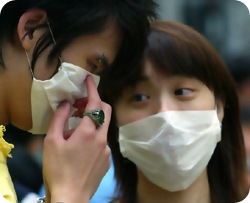Launching 1st March 2023. Also check out: https://www.thailandmedical.news/
SARS is spread in the main by close person-to-person contact and is transmitted by respiratory droplets produced when an infected person coughs or sneezes, which are propelled through the air and deposited on the mucous membranes of the mouth, nose, or eyes of persons who are nearby.
The virus can also be spread when a person touches a surface or object contaminated with infectious droplets and then touches his or her mouth, nose, or eyes - it is also suspected that the SARS virus might spread more broadly through the air or by other ways.
Close contact means having cared for or lived with someone with SARS or having direct contact with respiratory secretions or body fluids of a patient with SARS - this can include kissing or hugging, sharing eating or drinking utensils, talking to someone within 3 feet, and touching someone directly - close contact does not include activities like walking by a person or briefly sitting across a waiting room or office.
 The time between exposure to SARS-CoV and the onset of symptoms is called the "incubation period" and for SARS it is typically 2 to 7 days, although in some cases it may be as long as 10 days - incubation periods of up to 14 days have been reported.
The time between exposure to SARS-CoV and the onset of symptoms is called the "incubation period" and for SARS it is typically 2 to 7 days, although in some cases it may be as long as 10 days - incubation periods of up to 14 days have been reported.
Experts say people with SARS are most likely to be contagious only when they have symptoms, such as fever or cough and are more so during the second week of the illness.
The Centers for Disease Control and Prevention (CDC) recommends that persons with SARS limit their interactions outside the home - for example, by not going to work or to school- until 10 days after their fever has gone away and their respiratory symptoms have improved - people with SARS are not contagious before symptoms appear.